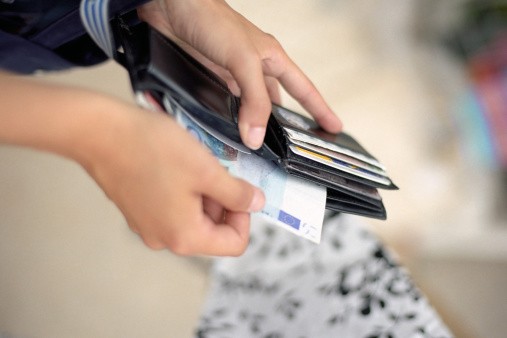Identity Theft Credit Card Fraud How to Protect Yourself Personal Finance
Post on: 16 Март, 2015 No Comment

Tips
- If you’ve been a victim of identity theft, you might be entitled to free credit monitoring.
- Check your financial statements regularly, keeping an eye out for any unfamiliar activity. If you find something irregular, report it ASAP.
- If you’re especially concerned about identity theft, consider freezing your credit report, which prevents hard inquiries without your permission.

-
Related How-Tos
Feedback
Identity theft occurs when someone obtains your personal information, such as your credit card data or Social Security number, to commit fraud or other crimes. The Federal Trade Commission estimates that 9 million Americans suffer identity theft annually. It sounds like a big number, but it isn’t.
For one, the hysteria has been stoked by much-publicized data breaches. In reality, identity theft only touches a sliver of the U.S. population each year (about 3%). One-quarter of those cases are credit-card fraud and not full-blown identity theft, according to FTC figures. The credit-card fraud occurs when a thief uses your credit card to make purchases. More serious is when someone uses your information to open accounts or take loans in your name. That’s when you’ll have to fight to get your credit restored and your name cleared, an arduous process that can take months or years to complete.
In response to concerns over identity theft, numerous companies and financial institutions have stepped in with products that monitor your credit, reimburse you for lost wages or funds and guard your identity. Some employers also now offer ID theft insurance to help you reduce the amount of time and money spent resolving the crime, so check with your companys benefits specialist about your eligibility.
Do You Need Identity Theft Protection? Before examining the services available, try these common-sense, no-cost measures to protect against identity theft and fraud:
Guard your information online. These days, many of us do most of our shopping and banking on the web. With all those account numbers and passwords floating around, it’s easy for someone to nab your information and go on a spree.
• Clear your logins and passwords. This is especially important if you’ve been working on a public computer. Change logins and passwords monthly.
• Pay for online purchases with your credit card, which has better guarantees under federal law than your online payment services or your debit card.
• Be alert for phishing, a trick in which spam or pop-ups mimic legitimate banks or businesses to obtain your personal information, which they use to access your accounts. Always verify that youre on a familiar Web site with security controls before entering personal data.
Monitor your bank and credit card statements. Check your accounts regularly so you know when something’s awry. Purchases you didn’t make should be obvious—like a gas fill-up halfway across the country.
Verify your mailing address with the post office and financial institutions. Identity bandits may fill out change of address forms so that delinquent credit notices remain off your paper billing radar.
Monitor your credit report. By law, you’re entitled to a free report every year from each of the three bureaus (Equifax. Experian. and TransUnion ). Request one every four months, changing bureaus each time. You can order the report directly through each agency, or at annualcreditreport.com. Use this URL—there are hordes of knockoff sites that will try to charge you for your report and other needless services. Scan it for abnormal activity, such as accounts or credit cards you didn’t open. (And dont fall prey to faux free credit report advertisements. )
Shred sensitive documents. Buy a shredder and regularly shred outdated bank statements, credit card applications, bills, and anything with your personal information before tossing it into the trash or recycling. Junk mail often includes some of your personal details.
Does it make sense to pay for ID theft protection if you’ve taken all these precautions? It depends on your spending habits and overall level of caution. You might want to invest in an identity theft protection service if:
• You do lots of online banking or shopping. • You dont have time to monitor your information on your own. • The thought of investing time and money into recovering from an identity theft sickens you.
Picking the Right Service Before you spring for identity theft protection, which, at a minimum, is likely to set you back at least $150 a year, consider the no-cost measures you can take to protect yourself. Remember, despite the hype, the odds of having your identity swiped are actually quite low. And no identity theft protection is bulletproof, so consider these factors before you buy.
First, decide whether youd like to purchase the services of a dedicated identity theft protection firm or one of the products offered by your bank or insurer. Many banks now offer customers daily credit checks that alert them to fishy activity in their accounts. Some will also provide insurance to repay lost wages or legal fees incurred as a result of identity theft or fraud. Other plans assign you a caseworker to help restore your credit. You can also try to bundle identity theft insurance with your home or auto coverage. Be wary of this kind of insurance, however these policies can be riddled with exclusions that may prevent you from ever collecting in the event of theft.
Then there are the specialty companies—LifeLock and TrustedID are two of the most prominent—that market themselves as identity theft protection experts. These companies offer a mix of preventive and reactive tools to maintain your identity and credit, the most common being fraud alerts and credit freezes.
Fraud alerts. Some identity-theft protectors will immediately place fraud alerts on your files with the three main credit bureaus, whether you’ve been victimized or not. In essence, it forces any bank or credit agency to balk before approving credit requests in your name. It’s not foolproof, though. The law only requires the creditor to take reasonable precautions before extending credit. This may only be a speed bump for a practiced thief, so don’t consider it a guarantee that your identity won’t be swiped.
Credit freezes. Freezes are far more effective than alerts. Icing your files prevents any company from accessing your credit unless you already do business with them, effectively sealing your records against any new creditor. Freezes can be a pain if you’re seeking a mortgage or student loan—or any form of credit. You’ll have to contact the bureaus to unfreeze your records, which can take up to three days. Plus, the credit bureaus normally charge a small fee whenever you freeze and unfreeze your files. Credit freeze rules vary by state.
Alerts and freezes are two measures you can take yourself, so consider whether you want to pay a company to do it for you.
If youve detected fraudulent activity, notify the financial institution where the fraudulent activity occurred first so they can freeze your account. Depending on the situation, youll need to file a complaint with the FTC and your local police department, as well as investigate all of your other accounts. And keep a vigilant eye on that credit report.
Related WSJ Articles and Blog Posts:














